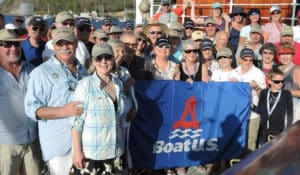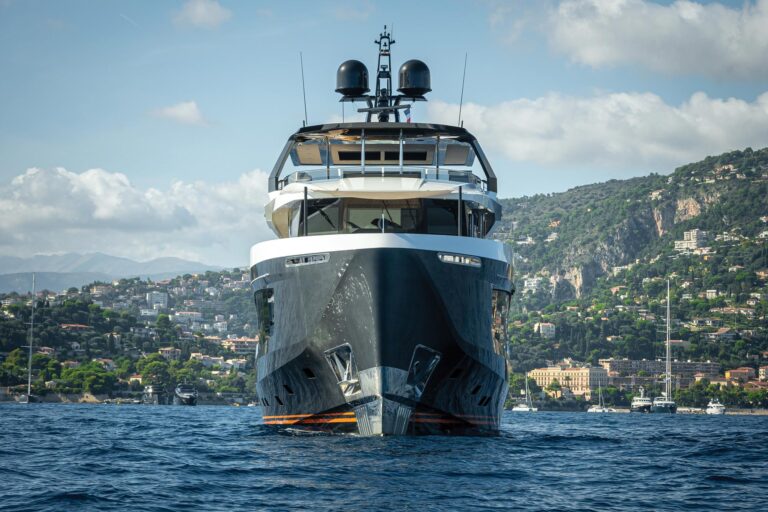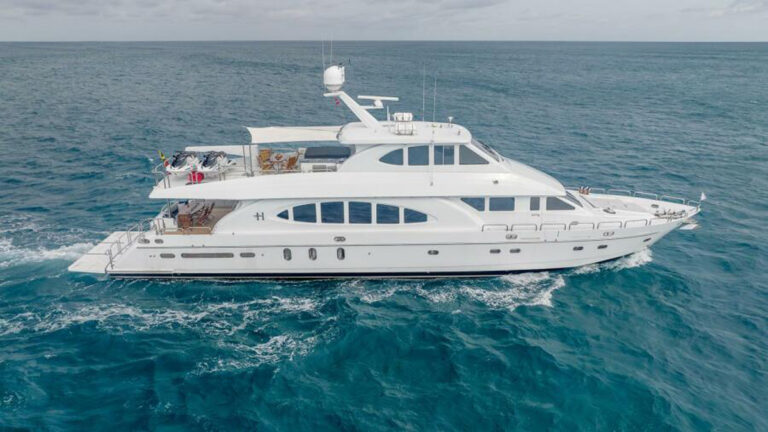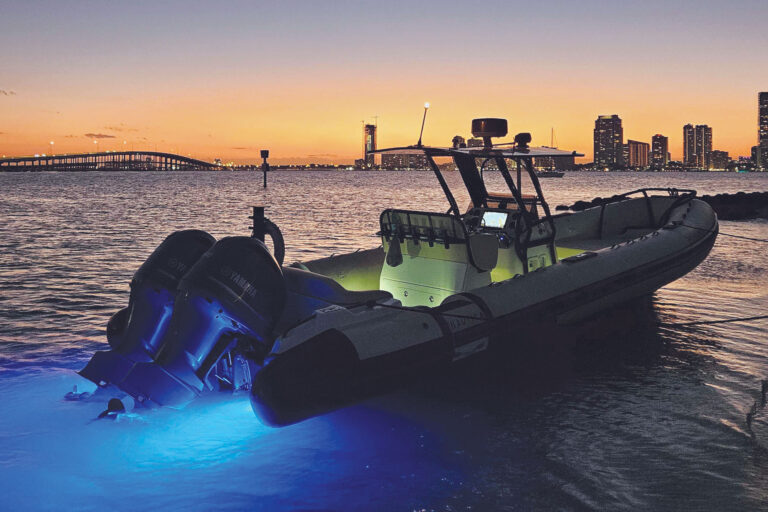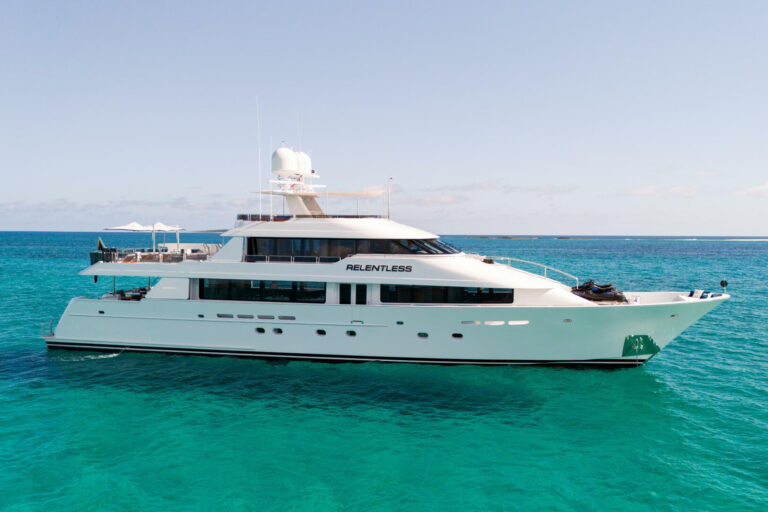
True Confessions of Professional Captains
Admit it. You’ve watched that gorgeous 125-foot yacht coming alongside the dock, her authoritative thrusters positioning her perfectly between two other gleaming megayachts, and her captain, wearing a starched white shirt adorned with official-looking epaulets, standing at the wing controls, calmly giving orders to his young, attractive female crew. You want his job.
Or perhaps you’ve taken your wife and kids aboard a small tour boat to see your favorite city’s waterfront sights, and instead of paying attention to your tour guide, you’ve watched the captain as he deftly controls gear and throttle, using prop wash to precisely maneuver his vessel. He sounds his boat’s baritone horn as he exits the loading dock and heads out into the busy harbor, while his passengers, thrilled to be out on the water, look at him in awe. You’re thinking, “I can do this when I retire. And I’d look good with a white beard too.”
Maybe you’ve had fantasies about selling your house, buying a bigger boat, getting your captain’s license and convincing your wife that she would love serving dinner and drinks to guests who have chartered your boat for private cruises. You could “work” six months a year; the money from charters would take care of your boat expenses, and you could spend the other six months in the islands drinking cold Kaliks and eating fresh conch. What the hell._ Carpe diem_.
Well, before you quit your day job, maybe you should know what it’s really like to be a professional captain. Yes, there are reasons to be envious of these jobs, but there are surprises and challenges that no seamanship school or captain’s study program can prepare you for. Here are some tidbits from professional captains — their names and particulars have been changed to protect their identities, but their stories are true.
The Couple
Bob and Sue had had enough of their first careers, and once their children were on their own, they sold their home, bought a 50-foot sailing cat and moved aboard. They planned to run a charter business for half the year and go sailing the other half.
Bob is a talented fix-it kind of guy, which is a good thing, because their cat wasn’t new. It was a boat “with potential.” For the first year, every time I visited their boat, Bob was either hanging upside down in the engine room or hanging right side up from the top of the mast. Each week he’d make a list of what needed to be upgraded or replaced, but the list continued to grow.
While Bob was virtually rebuilding their boat, Sue set up the galley and salon for entertaining. To enhance the marketability of their new charter company, she obtained her state license as a minister so that wedding ceremonies could be performed afloat. She also created a color brochure and pitched all the local hotels, restaurants and marinas for referrals.
Their first charter was a wedding at sea. The wedding couple insisted on being married while sailing directly beneath the Chesapeake Bay Bridge, which on a summer Saturday afternoon can be like driving the New Jersey Turnpike the day before Thanksgiving. As Bob was dodging tankers, sport-fish boats, tugs, barges, racing sailboats and skiffs trolling in the main channel, Sue thought it would be a nice touch if she engaged the wedding party in some pleasant ice-breaking conversation. Approaching the groom’s mother, she asked, “So I bet you’re excited. Tell me how your son and his bride-to-be met.” Flicking a cigarette onto the cockpit sole, Mom replied, “Hell if I know, I just met her.”
Things went downhill from there, at least with this charter. But Bob and Sue’s tenacity paid off, and they eventually developed a nice little business. Sue adds, “Don’t try this if you really need the income to live on. It’s a lot of work, but it can earn just enough to go cruising for a couple of months.”
The Bus Driver
John had a steady job as a public-school educator. Obsessed with being around boats, he earned his 100-ton captain’s license, and during summer breaks he ran water taxis in a city harbor. His vessels carried between 25 and 65 passengers, and on busy weekends he ferried thousands of people among popular tourist attractions. While John thought of himself more as a bus driver, his passengers expected him to be an expert on restaurants, bars, museums, movies, concerts and sporting events. “What’s the best Italian restaurant?” “Which bar has the best live music?” “Where can I get tickets to the game?” Trying to answer everyone while watching out for inebriated paddle boaters, clueless kayakers and obnoxious muscle boats was stressful.
His biggest challenges were dealing with raucous sports fans being ferried to and from the nearby ballpark. “I don’t know why, but Yankees fans were my most difficult passengers. Many of them had obviously been drinking before the game, and if the Yankees lost, I had my hands full, especially with guys who thought nothing of urinating over the side.” But John has good memories too. “I bet that, throughout Japan, there are thousands of photographs of me at the helm with a smiling Japanese woman next to me.” After many years, John retired from his summer job to go sailing, and quite understandably, he doesn’t often invite guests.
The Loner
Years ago I met Anthony, the captain of a sleek 85-foot motoryacht that was tied up next to me at a high-end marina in the Bahamas. For a week, I saw him doing nothing but washing and polishing the boat. He had no extra crew, and he seemed lonely. When I finally noticed the name of this multimillion-dollar yacht, Useless, my curiosity made me ask him about his job, his owner and, above all, why the name Useless? With a mixture of caution and sarcasm, Anthony replied, “Oh, my owner named his boat after his wife. Need I say more? But, hey, it’s a job. Thankfully, he’s so busy running his business that he’s hardly ever on board.” I sure hope Anthony found another gig. He seemed like a genuinely nice guy.
The Party Planners
Rick and his wife, Samantha, were the captain and stewardess on a 125-foot motoryacht owned by a group of wealthy men in the entertainment industry.
The boat has a reputation for being a party boat. Some call it a floating “animal house.” The captain’s job was to take the boat from port to port, where it would be loaded with a fresh group of young, beautiful bikini-clad females ready to party. Partying would continue nonstop for a day or two, and then it would start all over at the next port with fresh participants.
For the first two weeks of his job, Rick thought he had died and gone to heaven. His only problem was trying to concentrate on piloting the yacht when most of his female passengers were running around the deck stark naked. Samantha wasn’t thrilled.
Soon, neither was Rick. He began to refer to his owner’s guests as mini hurricanes, leaving a path of destruction everywhere. “I eventually realized they had no brains. They’d be served a drink, take a sip, forget where they left it and demand another one. My crew just followed their paths, picking up clothes, towels, drinks, uneaten food, sunglasses, lotion and cell phones. It may have been OK for a few hours now and then, but day after day, night after night was exhausting. One night Samantha and I tried escaping to the flybridge, but I can’t describe what I found going on up there. What I thought was a dream job turned out to be a nightmare.” Rick and Samantha are now happily running a larger yacht for an older couple that treats them like part of their family.
Overall, among the biggest complaints I’ve heard are the unrealistic expectations and demands of owners. Forced to run in bad weather or with mechanical problems to meet their owner’s social obligations is not only stressful, but also potentially dangerous. Others feel they are expected to serve as social directors or baby sitters for spoiled, pampered guests in addition to performing their duties of running and maintaining their ship. And when the owner and his guests are on board, the captain is often on duty 24/7.
Of course, there are good parts to almost all these stories, and many captains I spoke with love their jobs. Captain Jeff, for example, works for a retired gentleman who owns a long-range trawler and who loves to cruise to exotic lands with friends and family. The owner spares no expense in maintenance or upgrades, knows a lot about the boat’s operation and respects the decisions of his captain. Instead of having to sit for weeks in all the “to be seen” places like Nantucket and Fort Lauderdale Jeff has had the opportunity to cruise more than 30,000 miles to some of the world’s most unforgettable destinations. He knows his job is not perfect, but he can’t think of anything he’d rather be doing than piloting this multimillion-dollar yacht to places he’d only dreamed of. “I confess, sometimes it’s hard to believe I’m being paid to do this.”

